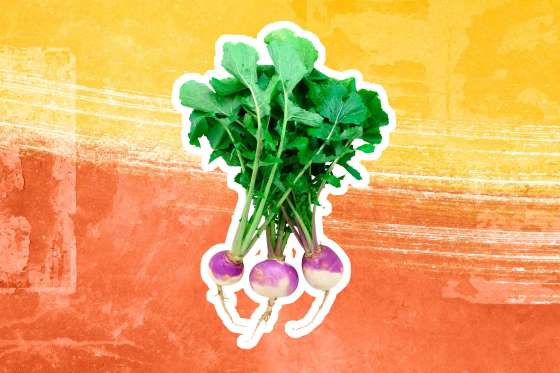TURNIP GREENS
Reboot your health with these disease-fighting fall superfoods.
If you’re tossing the tops of turnips, you’re seriously losing out. Turnip greens are host to immune-boosting vitamins A and C; a whopping 500 percent of vitamin K, which regulates blood clotting; folate; and about four times the amount of calcium found in its fellow cruciferous veggies. Steam the greens to mute their bitterness or toss with a sweet citrus vinaigrette to balance it out. These are 10 of the healthiest vegetables you can possibly eat.

KALE
Fall is kale’s time to shine. Not only does it thrive in cooler weather, meaning you’ll find it fresh for longer, you can hit your daily value of vitamins A, C, and K all in one bite. ‘It’s such a strong superfood contender because you knock out certain nutritional needs just by eating one specific food,’ says Libby Mills, MS, RDN, LDN, spokesperson for the Academy of Nutrition and Dietetics. Kale also has antioxidant and anti-inflammatory properties that may help protect the heart and prevent some cancers, and its fiber and magnesium content aids in digestion.

BEETS
Beets are a bowel-regulating dream at nearly 90 percent water and high in fiber. They’re also low carb and have a low glycemic load, which means they won’t cause your blood sugar levels to spike. Try roasting them and tossing on a salad.

POMEGRANATES
Take advantage of these powerful little bulbs while you can, because they’ll be gone before you know it. Pomegranates have a super-short season but pomegranates have many important health benefits. Studies have shown that eating pomegranates and drinking pomegranate juice may protect against certain cancers and Alzheimer’s disease, increase blood flow to the heart, and keep blood pressure and cholesterol balanced. They’re also packed with antioxidants and have a little fiber and vitamin E. ‘They have a great reputation for a good reason. A half a cup is easily tossed into a salad or on yogurt,’ says Mills. Pomegranates even have more antioxidants than green tea.

BRUSSELS SPROUTS
This Thanksgiving staple might be the healthiest thing on your table. Each mini cabbage is full of antioxidants, vitamin K and C, folate, and filling fiber. ‘Brussels sprouts also have anticancer properties that push this to the top of the cruciferous veggie list,’ says Mills.

APPLES
‘When they say ‘an apple a day keeps the doctor away,’ they aren’t kidding,’ says Mills. Apples contain bowel-regulating pectin and phytonutrients that help lower cholesterol.

KUMQUATS
This tiny sour fruit packs a big punch of vitamin C, antioxidants, and even protein, which is not commonly found in fruits and veggies. If you’ve never tried one, it’s important to eat the peel—this is where much of the antioxidants live that help fight free radicals that can harm cells.

PUMPKINS
‘Pumpkins are the quintessential fall produce,’ says Mills. While the flesh and peel are both incredibly high in vitamins A and C, both vital to immune, skin, and eye health, don’t forget about the seeds. ‘Pumpkin seeds are a great source of zinc, which help our bodies heal and preserves our sense of taste,’ says Mills. Try roasting them low and slow and eating the whole thing—much of the zinc is found in a membrane between the outer shell and inner kernel.

OREGANO AND ROSEMARY
Herbs can be superfoods, too. Oregano and rosemary are sturdy plants that can remain pick-able during cooler temperatures; both deliver antibacterial and antifungal properties. ‘We use them in small quantities but their antioxidants and phytochemicals are very condensed, so they provide a nutritional bang,’ says Mills.

DAIKON RADISH
This mild Asian veggie is packed with vitamin C, fiber, and potassium. Potassium aids in metabolism and acts as an electrolyte to counteract the effects of sodium, which helps regulate blood pressure.

SWISS CHARD
Swiss chard might be a step below leafy green queen kale but it’s still a powerhouse high in vitamins K, A, C, and E, magnesium, potassium, and smaller amounts of B vitamins and zinc.

BUTTERNUT AND ACORN SQUASH
‘Sometimes carb conscious people steer clear of these starchy squashes, but they have a good carb effect similar to whole grains,’ says Mills. ‘They don’t cause an immediate spike in blood sugar.’ Butternut and acorn squash also have contain pectin, a soluble fiber that helps lower cholesterol, antioxidants that reduce inflammation, and blood sugar-regulating B vitamins.

CAULIFLOWER
Just because cauliflower is paler than other cruciferous veggies doesn’t mean it’s devoid of nutrients. It has four times the recommended amount of vitamin C, 50 percent of your daily potassium allotment, is high in fiber, and contains vitamin B6, which plays a role in metabolizing fats and protein.












